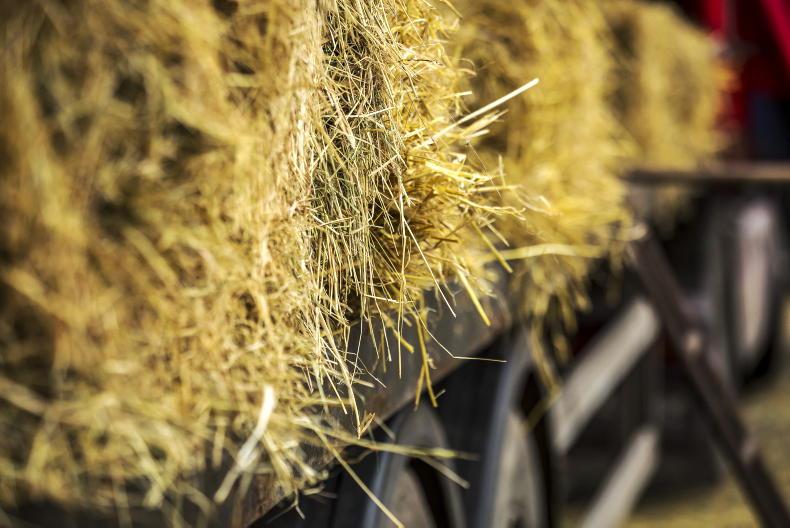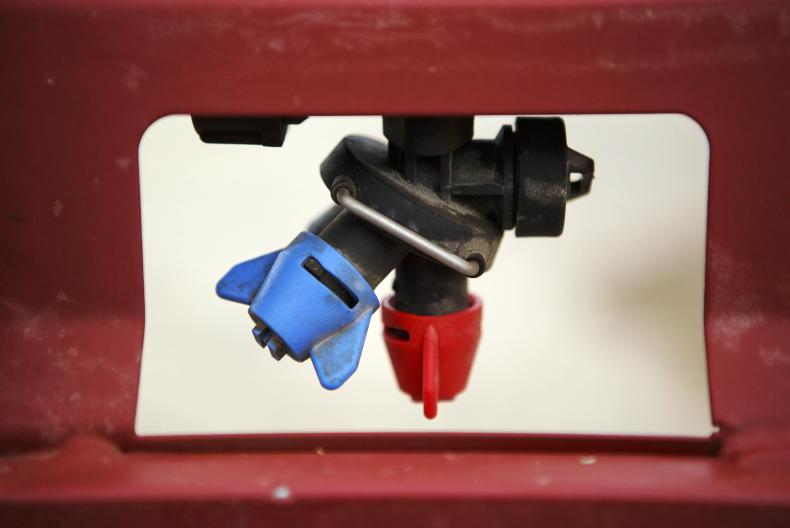Conall farms alongside his father Joe near Ballygar, Co Galway. They operate a mixed farm, with suckler cows and a medium-scale tillage farm, as well as an agri-contracting business which mainly focuses on baling silage and slurry spreading due to the area they are located in.
They grow a wide range of crops, with winter barley, winter oats, spring barley, spring oats, and spring beans fitting into the rotation for this year.
All crops are grown for feed and are established by a plough-based system, however Conall is curious about min-till and direct drilling, especially after his spring beans are harvested.
Their land consists of heavy clay soil, with around 25% of their tillage land being either rented or leased within a three-mile radius.
Conall also works as a secondary school teacher teaching Biology and Agricultural Science.
Based near Tullow, Co Carlow, Jack is farming organically this year for the first time, having completed the conversion process over the past two years.
There are 90ac of tillage on the farm, with 7ac planted in native woodlands.
Jack operates a minimum tillage system, which can be challenging in an organic setting, but he says it worked successfully last year. The farm has a relatively free-draining medium loam soil.
This year, Jack is growing oats for Tirlán and milling wheat for Oak Forest Mills. There is also 40ac in multispecies swards for rotation purposes. This is being grazed by non-organic sheep, which are allowed to graze on the farm for a maximum of 180 days every year.
Jack is also involved in a European Innovation Partnership project, “A Practical Silvoarable Agroforestry Demonstration & Research Project for Ireland”. He hopes to have planted 3,000 trees in his fields as part of this agroforestry project by the end of this year.
Patrick returns for a second year of From the Tramlines.
He farms 210ac of mostly light, free-draining land near Bunclody, Co Wexford, of which 170ac is tillage.
He operates a plough-based system. He normally grows a mixture of winter and spring crops, but the weather in October and November prevented autumn planting this year. Patrick has no regrets not planting winter crops as he has seen many patchy and poor crops.
Spring beans, spring barley for feed and roasting, and gluten-free spring oats for Tirlán are being grown this year.
It is his first year growing gluten-free oats having pursued a contract for the past few years.
Patrick has moved away from malting barley this year due to issues with high protein levels which he puts down to high levels of chicken litter being used on the farm. Patrick tries to import organic manures when possible.
He also keeps 150 pure-bred Romney ewes and 30 cattle. He incorporates the sheep into his tillage enterprise through the grazing of cover crops.
Alex farms with his father, Ken, near Street, Westmeath.
He returned from Kildalton College to begin tillage farming alongside their established agri-contracting business.
Slurry spreading, fertiliser spreading, pit and baled silage, and stubble-to-stubble tillage operations are carried out by the contracting side of the business.
The tillage farm has now grown to 750ac, half of which is rented, and the other half is share-farmed with approximately 10 landowners. Some 200ac of their land is farmed organically. About 90% of crops are established by ploughing, with oilseed rape and crops following break crops established by min-till.
Winter cereals, beans, spring barley, maize and spring oats are also grown.
Barley, organic oats, and hybrid spring oilseed rape are grown for seed, while the remaining organic oats are destined for Flahavan’s.
Alex places an importance on reducing compaction on their heavy clay soils, with two tracked combines present on farm. Pockets of their soil would be quite shallow, while 150ac is very stoney.
Damien is a crops teacher and tillage farm manager at Teagasc Kildalton College in Piltown, Co Kilkenny.
Some 33ha of the 178ha farm is devoted to tillage, with the remainder split between dairy, beef, sucklers, horticulture, and equestrian.
Damien notes that the farm is not being run for commercial reasons, but for educational and research purposes.
The farm has a wide range of crops including winter and spring varieties of wheat, barley and oats, winter oilseed rape, spring beans, and maize. A plough-based system is used, but min-till has been dabbled with, for example with winter wheat after oilseed rape.
The farm hosts experimental trials, such as the Department of Agriculture, Food, and the Marine’s Cereal Variety Evaluation trials, which feed into the recommended lists published each year. Teagasc also has some fungicide trials here, as there is a higher disease pressure than at Teagasc headquarters in Co Carlow.
Students at the agricultural college carry out most of the tillage work between January and May under the supervision of staff before they begin their placement in time for harvest and autumn planting.
Tony farms a 330ac farm in Balbriggan, Co Dublin. Some 155ac of this land is owned, with the remainder leased.
Forage maize, beans and winter wheat are grown on-farm. However, the maize is not harvested traditionally, but is round-baled by a specialised baler.
Triticale is also grown as a cover crop after winter wheat and is cut for silage in the first week of May before planting maize shortly afterwards.
Based on a clay loam soil that is quite heavy, Tony began to move away from ploughing in 2011 to strip till due to a strong focus on efficiency and the environment. He has found success with this system, and now strip tills beans for many farmers in north county Dublin.
In 2018, Tony experimented with strip till and maize.
He has found that while yields are lower, quality is still high, and it makes sense financially and environmentally. He has also successfully drilled maize straight into cover crops and grassland.
Neill farms alongside his uncle, Allan Chambers near Seaforde, Co Down.
They farm 400ac of medium loam soil which has a high stone content. Most of this land is owned, with a small amount of rented ground also farmed.
They operate a plough-based establishment system with a one-pass used for planting crops. Winter wheat, winter barley, forage maize, and spring beans are grown on the farm, with all of these crops destined for the animal feed market.
There is also a broiler unit on the farm with a capacity of 75,000 birds. This unit is operated on contract for Moy Park. Neill notes that it is brilliant to be able to use the chicken litter from this unit on his tillage land, helping to maintain good soil fertility and reduce artificial fertiliser inputs.
John farms in partnership with his brother Alan at Shanagarry, Co Cork, on 235ac of owned tillage land. They both work full-time off farm, with John working as the cereal variety manager for Goldcrop.
Soil type varies due to the fragmented nature of the farm and each soil must be managed according to its individual characteristics.
A plough-based system is used mainly. John places importance on crop rotation, with a non-cereal break crop grown every three years, which may be established by strip tillage.
Winter wheat, spring barley, winter barley, winter oilseed rape, and winter and spring beans are grown on their farm. Many of these crops are grown as seed crops for Goldcrop, and malting barley is destined for Dairygold.
John manages Goldcrop’s combinable crop trials, which are based on his farm.
These trials cover a broad range of crops and the brothers intend to select varieties from international crop breeders that perform well under Irish conditions.
Alistair, his father Robert, uncle Tom, and grandmother Mary run Carsehall Farm near Limavady, Derry, on 600ac of land of which 250ac is tillage. The farm is also home to a herd of 270 dairy cows.
The farm is based on land that was reclaimed from the sea about 150 years ago and has a silty loam soil.
This year, Alistair is growing winter rye, winter oilseed rape, winter wheat, and winter barley. The farm also grows 30ac of lucerne every year. About 60ac of winter barley is destined for seed.
Traditionally a plough-based farm, Alistair has used minimum tillage this year on a proportion of his land. He is very happy with his min-till establishment, and crops are looking very green.
Alistair places an emphasis on organic manures, with all crops receiving some form of organic manure before drilling or into the standing crop.
Alistair’s farm is an Agriculture and Horticulture Development Board (AHDB) monitor farm, and Alistair has just recently joined BASE Ireland which is a group focusing on conservation agriculture and direct drilling crops.
Eamonn Cogan farms in Slane, Co Meath, with his uncle Thomas and cousin Paul. They run a plough-based establishment system across 1,000ac.
Eamonn participated in From the Tramlines last season and got a good run with winter planting. His winter crops established very well, considering the wet weather conditions in the back end of 2022. Eamonn is now up to date with fertilsier and herbicide applications. Oats were planted on the farm almost two weeks ago, so planting is now complete for the 2023 season.
The focus is on winter crops with winter oilseed rape,winter barley, winter wheat and winter oats usually planted. Weather interrupted oat planting last autumn and so they were planted in the spring.
Some soils on the farm are very heavy, but more are free-draining. Eamonn said the farm receives about 850mm of rainfall annually.
Kevin O’Gorman and his brothers Brendan and John are based near Castledermot, Co Kildare, but the brothers farm in many different areas as they work with different landowners to secure fresh ground for potatoes. They are currently working in counties Kildare, Laois and Carlow.
The brothers’ main business is potato production and they place a focus on producing good-quality, high dry matter potatoes. This year they also have winter oilseed rape, winter barley, winter wheat and winter oats planted. They will grow spring malting barley as they had more spring crops to plant.
The brothers place a huge focus on soil health and making sure phosphorus and potassium levels are up to scratch.
They actively work with other landowners who want a break crop on their farm and grow potatoes on this land.
When we spoke to Kevin this week he was busy in the pack house.
The brothers will not start planting potatoes until April. Roosters are the main variety of potatoes on the farm.
Mark farms alongside his wife, Lisa, his mother, Helen, and his father, Eddie, near Cashel, Co Tipperary.
They run a medium-sized tillage farm, and also work as agricultural contractors, specialising in slurry spreading, hedge-trimming, round baling, especially for silage, and reseeding grassland.
This year, Mark is growing winter barley, winter wheat, winter oats, spring barley, spring oats, spring beans, fodder beet, and fodder maize. In terms of premium markets, the oats are grown for porridge with Flahavan’s, and the spring barley is grown for the malting sector with Dairygold.
Mark runs a plough-based establishment system mainly but has direct drilled 20ac of his spring beans this year with a Claydon drill. The farm has medium to heavy soil throughout its fields but is not too difficult to work.










SHARING OPTIONS